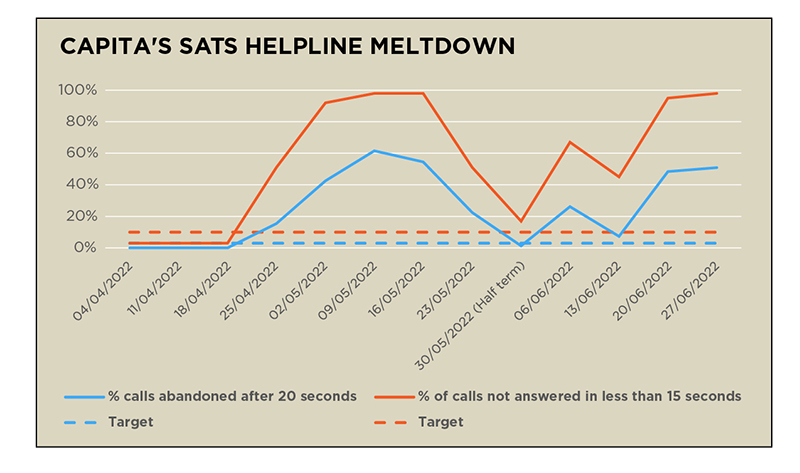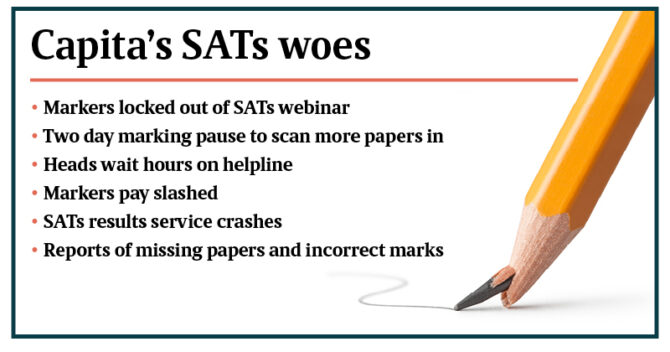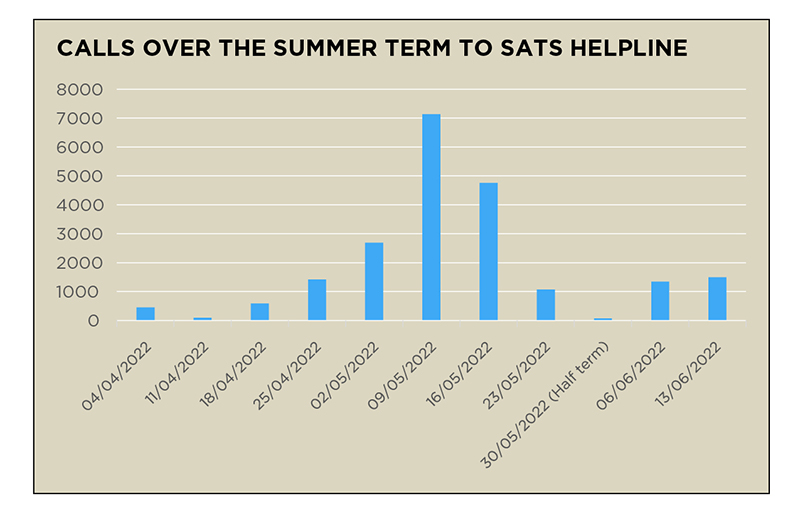Two-thirds of disgruntled teachers calling Capita’s SATs helpline hung-up after no-one answered the phone as the service went into meltdown during the height of this year’s test season.
Ministers have now launched a “lessons learned” probe into the outsourcing giant’s first SATs series under its £107 million contract. Unions had raised “deep concerns” into its management.
Headteachers previously told Schools Week how they were waiting on the phone for hours to get answers to, sometimes simple, questions.
New figures obtained by Schools Week show how 61.6 per cent of calls were abandoned by callers who waited more than 20 seconds in the week of May 9 – when SAT tests began.

In the same week, just 2 per cent of calls were answered in less than 15 seconds. Both fall well short of key performance indicators agreed as part of Capita’s government contract.
Capita has apologised to schools and claimed call volumes to the National Curriculum Assessments helpline – which peaked at 7,100 a week – were “significantly” above forecasts.
But Paul Whiteman, general secretary of school leaders’ union NAHT, said “the frustrating thing is that the increased demand for support should not have come as a shock to anyone”.
“NAHT raised the need for additional capacity on helplines early on because it was the first year since 2019 that SATs have run as normal.
“Given that gap and staff new to roles it was always completely predictable that there would be a need for more support for schools and increased capacity to deal with questions and queries.”
The Department for Education has said it is now “working with” Capita to conduct a “thorough lessons learned exercise” to ensure “we minimise any issues in the future, including with the NCA helpline”.
Heads left waiting on hold
This year’s test cycle has been besieged with problems, including markers being locked out of a webinar and Capita’s results service crashing. It is the first series delivered by the private company, after a two-year pause due to the pandemic.
One of the firm’s key performance indicators set by government is that no more than three per cent of calls should be abandoned after holding for more than 20 seconds.
However, a Freedom of Information request by Schools Week shows from the end of April this was routinely missed – spiking at 61.5 per cent in the week Key Stage 2 tests took place in May. It appears to drop around half-term before rising again in mid-June, when the multiplication tables checks began.
Another KPI is that 90 per cent of calls must be answered in less than 15 seconds. But in the week of May 16, this dropped to as low as 1.85 per cent.
In the week of KS2 SATs, calls peaked at 7,134, as did emails at 1,883.

In the FOI response, DfE said the Standards and Testing Agency – a government executive agency – agrees expected call volumes and appropriate staffing numbers with its supplier based on data from previous cycles.
But this year “the call volumes were consistently and significantly above forecast, in particular during peak school and marker engagement windows”.
Capita echoed this adding additional resource was deployed “but there were still high levels of calls”.
“We understand that this was frustrating for the affected schools and we apologise to them for this. We are committed to a process of continuous improvement and we are working with our partners at STA to learn the lessons from this year to improve delivery of next year’s test cycle.”
‘A lot of learning to be done’
Neither DfE nor Capita would confirm if these KPIs related to the firm’s payment, claiming they do not comment on commercial matters.

Whiteman said the “whole debacle has been unacceptable and must be fixed for next year. The government want schools to deliver SATs, therefore government have to make sure everything is properly in place for them to do so.
“There is a lot of learning to be done and improvements to be made before the new cycle starts next academic year.”
DfE said it will engage with schools during the “lessons learned exercise”.
















Your thoughts